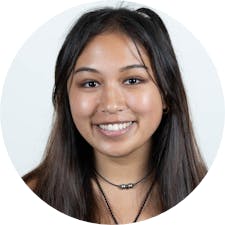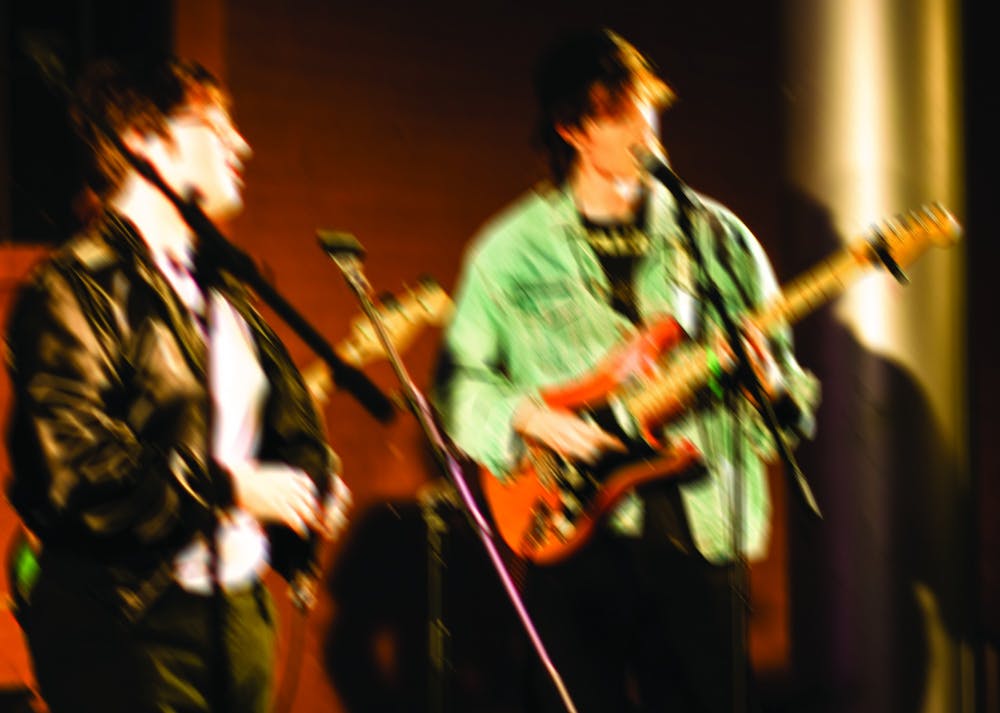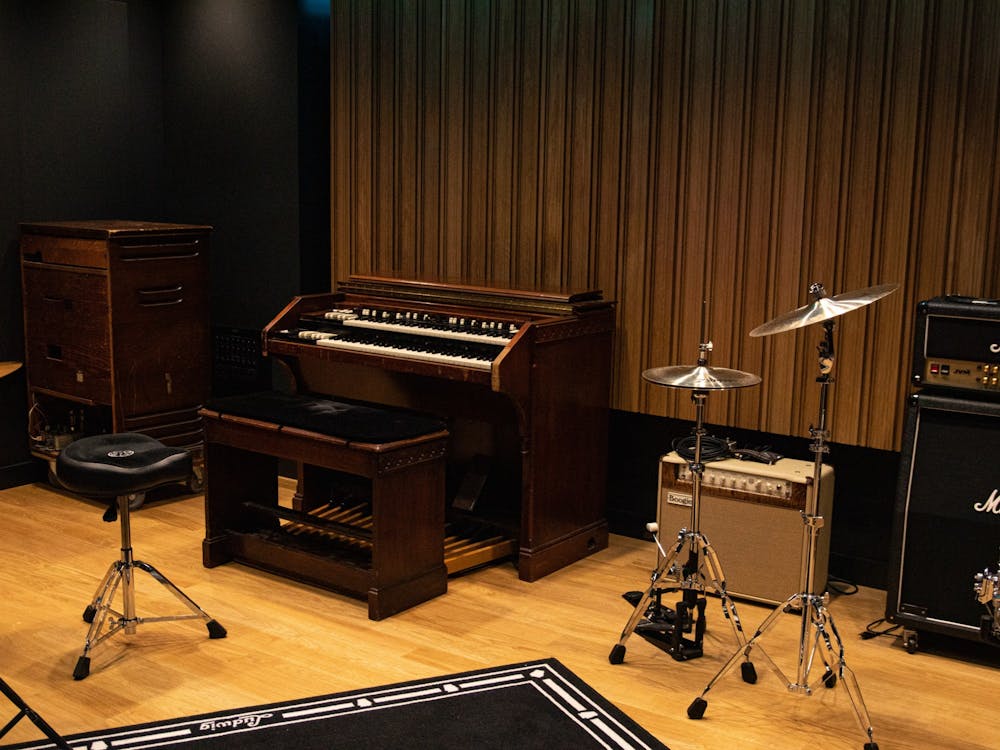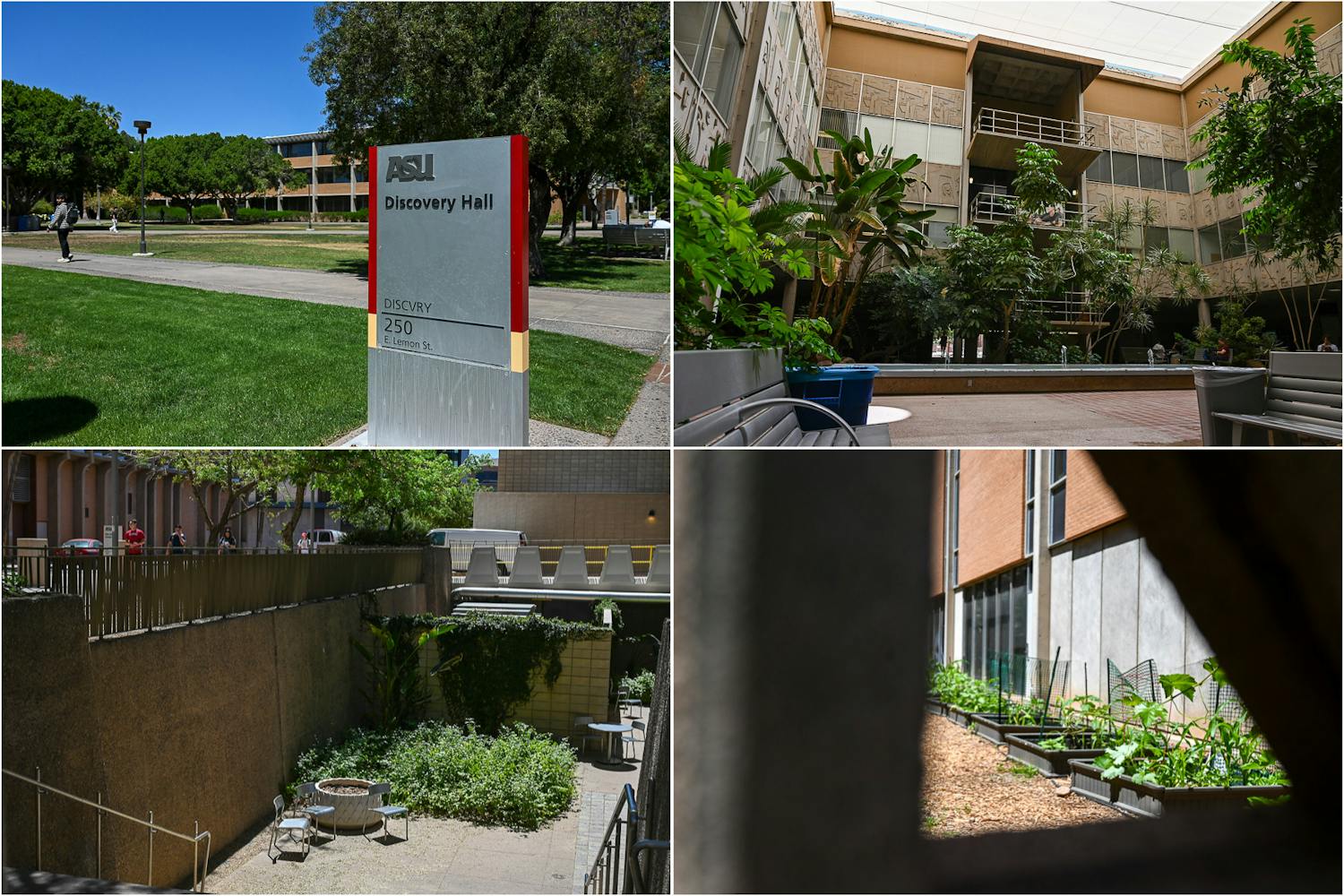Photo by Hajin Lee
The rumble of 1,700 audience members filled the warm summer air at the Pepsi Amphitheater in Flagstaff — all eagerly waiting for the show to start.
Before the touring artists took the stage, a girl and her guitar faced the spectators. Standing front and center, she looked two inches tall to the people at the back of the crowd.
"The first thing I noticed was just how huge the audience was," said Ellie Fern, a junior studying popular music. "The crowd went back for what seemed like miles, and I could clearly see the people smiling in the front row."
She did her typical routine before taking the stage: she took deep breaths, had a sip of water, shook out her nerves and tuned her guitar. Then, she got her cue.
But she wasn't phased by the crowd. If anything, she was more nervous to sing in front of 20 classmates from her voice class.
"It feels like this is where I'm meant to be, and this is what I'm supposed to be doing," Fern said. "I'm going to show the people my music, and I'm going to connect with this audience because this is exactly what I was put on this earth to be doing."
The next day she went back to her normal routine. She made her way over to one of the latest additions to the Downtown Phoenix campus: Fusion on First.
Nestled between a YMCA and a Circle K, Fusion opened at the start of the Fall 2021 semester. Not only does it offer on-campus housing for up to 550 students, but it also created a home for the only undergraduate music program not based on the Tempe campus: ASU's popular music program, which started in Fall 2020, is a specific concentration within the Bachelor of Arts program in music.
After two years, the program's students and faculty have forged an environment focused on cultivating students' various interests in music and preparing them to enter today's music industry.
Composition
Because the popular music program started during the pandemic, the first cohort of 36 students was taught virtually. Fern, part of the program's first class, said she felt lucky to have been a student in that first year. Despite all her classes being on Zoom, she saw it as an opportunity to grow closer with her peers and faculty.
John Paul Rabusa, a senior studying popular music, said the program's director and professors turned to their students to create a good learning environment because the program was so small.
"I felt like a trailblazer," he said. "We had the ability to help shape the program in the way we thought would be best for the future students that were coming in."
But the early-pandemic funk set in. Some days, Rabusa would lay in bed and question what he was doing with his life taking music classes through a computer.
And, like anything new, there were growing pains. Looking back at his time in the program, senior Kenji Beriau said he felt like a guinea pig testing out brand new classes and equipment.
"On the plus side, that's how you learn best, is when things aren't working," Beriau said. "Nothing has been smooth, but nothing good is ever smooth."
Abigail Parks, a junior in the program, said it's hard to imagine all the new opportunities in the program she and her peers are going to miss out on once they graduate, but it's fulfilling to say she was there when the program first started. Reflecting on her virtual year, she realized they didn't have any of the physical resources they do now.
"Not having all those things readily available to us at the time made us a lot more creative and had us thinking of ways that we could get together and make the best of the situation," Parks said.
Production
As students and faculty established the popular music program's foundations over the next two years, it began to fuel their passions in return. The trailblazing work of the so-called guinea pigs started paying off.
Fern, a singer-songwriter, said her voice has become much stronger after taking voice lessons through the program for the first time. The program also exposed her to music styles and forms of production she wouldn't have tried otherwise.
"I don't think I would have grown nearly as much as I have ... if I didn't go to school for music," she said.
The program has helped other students discover career paths they never expected to go down.
Parks attended the Burlington County Institute of Technology, a vocational high school in New Jersey, where she studied voice performance. She grew up performing in choir and musical theater, which helped her make the decision to enroll in the popular music program with a performance focus.
But the deeper she got into the program, she realized she had a greater passion for songwriting and producing music.
"I want to work with other artists ... and eventually I want to open up my own record label," she said. "My focus would be more on [people of color], especially women." She added that the flexibility of the program feels like a good fit for her to "experiment in these newfound passions."
The popular music program has a unique focus on the modern music industry and entrepreneurship. ASU's other music programs revolve around musicology, education and theory, as they classically train students in specific instruments or genres.
But in today's music industry, "you need professionals to wear multiple hats," said Samuel Peña, assistant director of the popular music program. Peña and other popular music instructors want to prepare students for the music business by giving them an interdisciplinary skill set and empowering them to be entrepreneurial.
The physical elements of Fusion are also fundamental to the popular music major experience. Fusion holds practice rooms that can function as mini recording studios, acoustically treated ensemble rooms with PA systems, and an equipment desk where popular music students can check out DJ tables, microphones, laptops, keyboards and other technology for use.
These musical resources, along with classes and professors, prepare students for an individual capstone project in their senior year. There are about 15 students currently working to complete their capstones to be the first graduating class of ASU's popular music program.
Senior Sophia Bavishi is dividing hers into two sections — one each semester. For the first, she will create a digital set by live looping using an Ableton Push. Then, she'll record the set and film an entire performance. For the second part, she'll do a live performance at a local venue.
"I never saw myself as a live digital performer," she said. "This program has opened my eyes to something that I think has really now resonated with me and become a part of my performing."
Rabusa, who is also working on his capstone, saw a recurring theme throughout his time as a popular music student. Aside from building his own project, he helped build the program and the growing music scene in downtown Phoenix.
"We're really starting something new," Rabusa said. "We're shaping what the Phoenix music scene is going to look like for years to come."
Promotion
It was 2019 and, like many of his peers in popular music, Rabusa had applied to Berklee College of Music, a nationally renowned music school in Boston, Massachusetts.
Rabusa grew up in metro Phoenix as a first-generation Filipino American. His father worked for the Phoenix Office of Arts and Culture, which Rabusa said connected him to the local art scene his entire life.
"I never had the perception growing up that Phoenix was less than a place like New York or LA or Nashville," he said. "I just always felt like it was not as developed as it could be, and I always saw the future for it."
Growing up in a musical family and attending church gave Rabusa a foundation in the arts since childhood. He attended Arizona School for the Arts, where he took a music track and was involved in choir and theater.
Rabusa always knew he wanted to get a college degree, but when he was accepted to Berklee, he had to turn down the offer because he couldn't afford it. Instead, he stayed in Arizona and enrolled at ASU as a vocal performance major.
"After [my freshman year] was done, I felt a little lost," he said. "I didn't necessarily feel like I fit in with the more operatic styles, or the more jazz styles, or the more musical theater styles."
That's when he learned ASU was developing a new degree for popular music, and the director of the program, Erin Barra-Jean, attended Berklee. He said it was "really serendipitous." When it came time for the program to break ground, his thoughts of Berklee faded away.
"We all come from very similar backgrounds where we didn't feel like we had found our community before we joined the popular music program," Rabusa said. "I think that we all [had] this desire to go out and find people who are like us. And when we did, it was the most exciting thing ever."
Distribution
Beriau was working at the equipment desk in Fusion one day when his boss, Patrick Driscoll, senior technology coordinator, told him the program was going to start doing open mics at Crescent Ballroom, a staple downtown Phoenix music venue down the block from Fusion.
Driscoll enlisted Beriau — who focuses on non-performance aspects of the program and has expertise in audio engineering and mixing — to help work the system and sound for students performing at the open mics.
After a few open mics, Beriau became acquainted with the staff at Crescent Ballroom.
One night, he walked over to the production manager and said "Hey, thank you so much for having me. If you ever need someone, let me know."
Then the production manager said "actually..."
Beriau said "that was the best word I heard that whole semester."
He was contracted to work at Crescent Ballroom shortly after. Beriau attributes his new job to the popular music program; the partnership between the program and Crescent has bridged the gap between ASU and the local music community, he said.
"I've been facilitating on behalf of Crescent now for the new interns at ASU who are trying to learn this stuff," he said. "I'm kind of setting the stepping stones for all the new Kenjis to learn how to run the sound for Crescent."
Aside from program partnerships, many popular music majors have established themselves as artists in every nook and cranny of the surrounding community through gigging.
Fern has been gigging since she was 16. She continues to pick up gigs almost every weekend as a form of income.
"This year, I've learned to compartmentalize myself; I have gigging Ellie and artist Ellie," she said. "When you’re gigging at restaurants and hotels, you are there to entertain the guests, so I play mostly cover songs that are well known. ... Artist Ellie can do whatever she wants."
Reception
Fern said she'd much rather struggle a bit and be happy with what she's doing than be stuck in an office job. However, learning to draw distinct lines between artistry and the industry has been a big part of being a popular music major.
"The hardest thing has been the transition of music as a hobby to now it's my life 24/7," she said.
Beriau enjoyed the transition from music as a hobby to music as a career. He transferred to popular music from computer science and said he is a lot happier.
"I feel like (the program) could be a bit more rigorous," Beriau said. "But I'm one of the fringe students to be on that perspective. That said, they are very accommodating no matter where you're at so long as you're willing to put in the work."
The program has seen more students enroll this year, adding their individual flair to the community — a testament to the program's future potential.
"Each semester I've been here I could see so much growth," Bavishi said. "I can only imagine (how far it'll go), and I'm very excited. ... This is only the start, and I think if I come back here in five years, it's gonna be huge."
Not only have students built a program from the ground up, but they have also made a mark on the University and the state.
"The music scene is gonna grow with or without the program," Beriau said. "But I think with us being an accredited University, it's going to have more students come over here and recognize there's more to Arizona than just my degree."
Edited by Alexis Moulton, Camila Pedrosa, Sam Ellefson and Greta Forslund.
This story is part of The Affect Issue, which was published on Nov. 2, 2022. See the entire publication here.
Reach the reporter at savannah.dagupion@gmail.com and follow @savdagupion on Twitter.
Like State Press Magazine on Facebook and follow @statepressmag on Twitter and Instagram.

Savannah is a senior studying journalism with a minor in English. This is her seventh semester with The State Press. She has also worked at the Lonely Planet and Write On Downtown.





